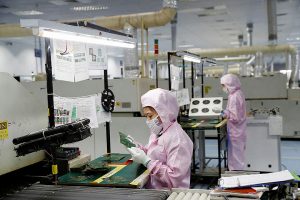THE weak job market and the declining quality of jobs are the result of the government’s failure to develop industries involved in production, which President Ferdinand R. Marcos, Jr., should prioritize during his term, according to a think tank.
“The jobs crisis and inflation have worsened due to the lack of production sectors that can provide steady employment and incomes and deliver the requirements for national development,” Ibon Foundation said in a statement.
The agriculture and manufacturing industries have been stunted due to decisions taken to open up the economy to foreign investment and products, Ibon Executive Director Sonny Africa said.
He noted that the respective shares of agriculture and manufacturing in the 2021 economy of 9.6% and 19.2% are at multi-year lows — “in the case of manufacturing, in 70 years.”
Unemployment hit a three-month high in May, while job quality deteriorated despite increased economic activity, the Philippine Statistics Authority reported.
The 6% unemployment rate in May compares with the 5.7% posted in April. February saw the recent for the indicator at 6.4%.
Mr. Africa said the new government must address the country’s “weak” agriculture and “shallow” industry to make the Philippines resilient to economic shocks, including inflation.
Inflation has forced the government to temper its economic growth targets for this year. Economic managers are now aiming for gross domestic product growth of 6.5-7.5%, against the previous 7-8% target.
The “strategic measures” that Mr. Marcos should consider to develop agriculture and industry include the repeal of the Rice Tariffication Law, Mr. Africa said.
The President must also reconsider the push for expanded economic liberalization and trade deals that are not beneficial to the Philippines, he said.
Before the previous Senate adjourned, it failed to ratify the Regional Comprehensive Economic Partnership, a free trade agreement involving Australia, China, Japan, South Korea, New Zealand and ASEAN. Senators expressed concerns about lack of protections for agriculture and other industries.
Mr. Marcos, who heads the Agriculture department, will deliver his State of the Nation Address on July 25. Since his first day in office, the President has promised to boost domestic food production and limit imports where possible.
“The Philippines is the most food-insecure country in emerging Asia due to its reliance on imported food to feed its expanding population,” Trinh Nguyen, an economic research analyst, said in an article published by the Carnegie Endowment for International Peace.
The share of food bought by the Philippines from other countries stood at 13.18% in 2021, according to the World Bank. — Kyle Aristophere T. Atienza
